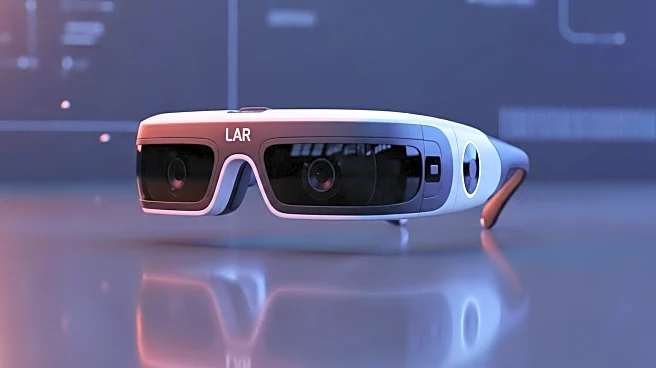What is the story about?
What's Happening?
Amazon is developing augmented reality glasses, codenamed Jayhawk, with a planned rollout in late 2026 or early 2027. These glasses will feature a full-color display in one eye, along with a microphone, speaker, and camera. The initial deployment will include 100,000 units for delivery workers in Q2 2026, with consumer models arriving later. This move marks Amazon's shift from backend services to visible consumer hardware, potentially altering shopping experiences both in stores and at home. The timing of the launch coincides with peak holiday shopping windows, which could significantly impact holiday sales if Amazon successfully integrates ergonomics and AI.
Why It's Important?
The introduction of Amazon's Jayhawk AR glasses could redefine the retail landscape by enhancing in-store conversions and enabling voice-driven purchases. Retailers may need to rethink product discovery and inventory localization as guided product information, live deals, and voice ordering become more accessible to consumers. This development could reduce traffic to independent search platforms and increase personalized, location-based advertising. The competition with Meta and Ray-Ban highlights the growing importance of AR technology in consumer markets, with potential implications for privacy and retail power dynamics.
What's Next?
As Amazon prepares for the Jayhawk launch, industry stakeholders are closely monitoring the development. Analysts have identified user comfort and style as potential adoption hurdles. The success of Jayhawk could influence developer support and consumer rollouts, with advertisers potentially paying for AR overlays. The broader impact on shopping and privacy will depend on how well Amazon integrates these technologies into everyday life, potentially making purchase prompts a regular part of consumer experiences.
Beyond the Headlines
The shift towards AR technology in retail raises questions about privacy and the power dynamics between major tech companies and consumers. As AR glasses become more prevalent, the ethical implications of personalized advertising and data collection will need to be addressed. Long-term, this could lead to changes in consumer behavior and expectations, as well as new regulatory challenges for tech companies.
















